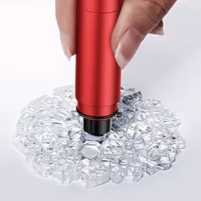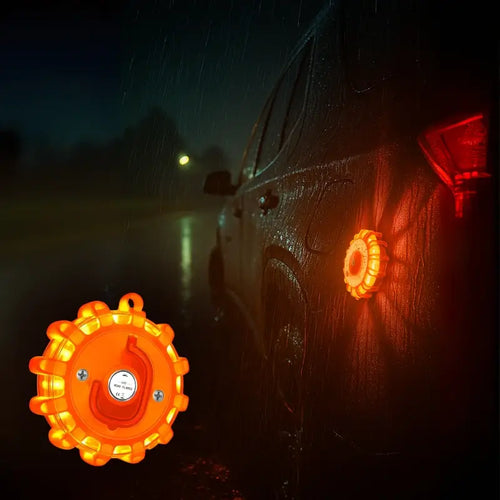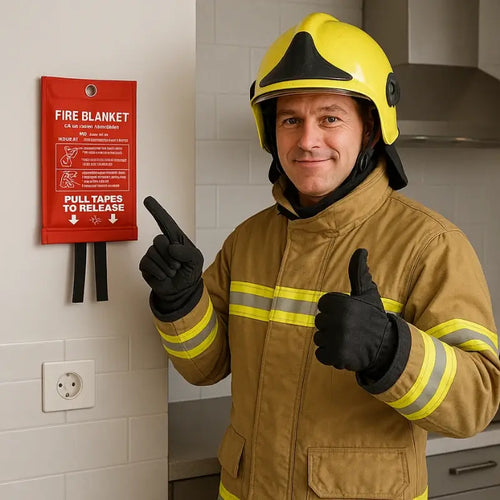Grease fires are among the most dangerous fires in the home - and they can start in seconds. Whether you are frying, deep-frying with oil or cooking with fat, it is extremely important to know how to react if a fat fire breaks out. Many people make mistakes in such a situation because they panic or don't know what really helps. In this guide, we show you step by step how to extinguish a grease fire safely - and above all, how to prevent it from getting that far in the first place.

How does a grease fire start?
A grease fire occurs when oil or fat is heated too much and ignites. Unlike water, which simply evaporates when heated, oil can reach a temperature at which it catches fire. Once this happens, the fire spreads extremely quickly - and is almost impossible to extinguish if you don't know the right method.
Typical causes of grease fires:
- Leave oil unattended while cooking.
- Use too much oil or fat at once.
- Heat the oil above the smoke point.
- Dripping grease on hotplates or open flames.
Most important tip for prevention: Never leave hot oil unattended and always keep an eye on the temperature. It is best to use a thermometer - this will keep you in the safe range for your recipe.

What you must never do in the event of a grease fire
When a fat fire suddenly starts, many people react rashly - and make it even worse. You must avoid these mistakes at all costs:
-
Never use water! Pouring water on burning fat sounds logical, but it is a fire hazard: the water evaporates immediately, throws the burning fat apart - and the flames explode.
-
Do not move the pan! Even if it is tempting to carry the burning pan outside - even a drop of spilled fat can spread the fire even further. Extinguish the fire directly where it started.
- Do not use the wrong fire extinguishers! Normal extinguishers are unsuitable and only spread the burning fat further. Only use a grease fire extinguisher (fire class F) - or follow the steps below.

How to extinguish a grease fire correctly
If there is a grease fire in your kitchen, proceed as follows:
-
Switch off the heat source. Turn off the stove or flame immediately so that no more heat is added.
-
Smother the flames. Carefully place a metal lid or baking tray on the pan to smother the flames. This will deprive the fire of the oxygen it needs. Glass lids are taboo - they can shatter from the heat.
-
Use baking powder or salt. For small fires, you can generously sprinkle baking powder or salt on the flames - this will smother them. Caution: Do not use flour or other powders, they can catch fire themselves!
-
In an emergency, get out and call for help. If the fire spreads or gets out of control, leave the home immediately and call the fire department. Your safety always comes first - never try to fight a large fire on your own.

How to avoid grease fires from the outset
The safest thing to do is to prevent a grease fire from starting in the first place. You can greatly reduce the risk with a few simple precautions.
Tips for prevention:
- Check the oil temperature: Use a thermometer to check that the oil is not heated above the smoke point.
- Choose the right pan size: Never pour in too much oil - otherwise it can easily overflow.
- Keep flammable items away: Never leave kitchen paper, wooden spoons or other flammable items near the stove.
- Always stay alert: Never leave the stove unattended when cooking with oil or fat.

Important helpers that you should have to hand
Preparation is everything - with the right tools within reach, you can react quickly in an emergency.
Recommended fire protection assistants:
-
Metal lid: To smother the flames.
-
Baking powder or salt: For extinguishing small fires.
-
Fire blanket: Heat-resistant and specially designed for kitchen fires.
- Grease fire extinguisher (fire class F): Specially for oil and grease fires.
Conclusion
Grease fires are dangerous - but manageable if you know how to react correctly. With these tips, you can act quickly and safely in an emergency - and prevent it from happening in the first place. Remember: preparation is the best protection. Keep your extinguishing aids to hand and stay alert while cooking.
Take a few minutes today and go through your kitchen emergency plan. It could save your home - and your life.








